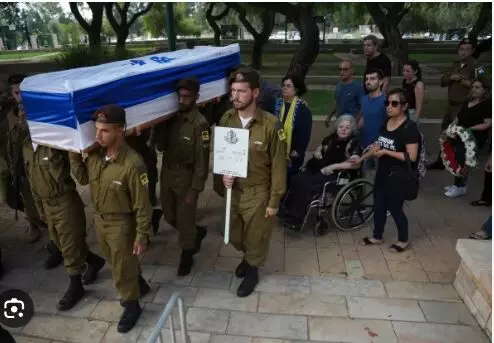
Over 550 Israeli soldiers killed so far, Palestinian death toll surpasses 25, 000
text_fieldsWith the reported deaths of twenty-four soldiers, the total number of Israeli soldiers killed has now surpassed 550 since the commencement of Israel's indiscriminate attack on Gaza on October 7.
This surge in casualties is putting increasing pressure on Prime Minister Benjamin Netanyahu, who remains determined to persist with the war. The deaths unfolded amid escalating talks about a potential ceasefire, while Palestinian casualties continued to rise.
The casualties occurred during fighting in and around the southern city of Khan Younis, with dozens of Palestinians killed and wounded in the crossfire. The heavy toll on Israeli soldiers is anticipated to intensify domestic pressure on Prime Minister Benjamin Netanyahu, both concerning his leadership and the handling of the ongoing war against Hamas.
According to an Israeli military spokesperson, 21 soldiers were killed in the Maghazi refugee camp in central Gaza when two mined buildings collapsed after militants targeted a nearby tank with grenades.
Reports suggest that explosives planted by the soldiers detonated prematurely. Additionally, three soldiers lost their lives in a separate attack in southern Gaza.
The military's advancement toward Khan Younis believed to shelter Hamas leaders in tunnels, has put approximately a million Palestinians at risk. Many have been displaced from other parts of the territory due to the ongoing fighting and the destruction of their homes and essential infrastructure.
Israeli blockades and the reported storming of hospitals in Khan Younis have left the wounded and dead beyond the reach of rescuers, aggravating the humanitarian crisis.
Aid officials have expressed concern about the dire situation, citing difficulties in reaching those in need. Hospitals in Khan Younis have faced attacks, with reports of gunfire hitting medical facilities, a claim denied by hospital staff and Hamas.
The conflict, sparked by Hamas attacks on Israel in October, has resulted in a staggering toll on both sides. Palestinian authorities report over 25,000 Palestinians, predominantly women and children, confirmed dead, with thousands more feared trapped in the rubble.
The international community, led by Egypt and Qatar, has been actively involved in brokering ceasefire proposals, with recent attempts focusing on phased ceasefires and releases.
The United States, represented by Middle East envoy Brett McGurk, is engaging in discussions in Cairo to secure a release of Israeli hostages and a humanitarian pause in the fighting. However, Hamas's conditions for ending the war, including retaining control of Gaza, have been rejected by Netanyahu, further complicating the peace efforts.
Despite growing discontent with Netanyahu's war strategy and a decline in support for his coalition, public opinion in Israel generally favours the ongoing military offensive. The government remains steadfast in its goals, emphasizing the destruction of Hamas's governing and military capabilities and the safe return of hostages.
As the conflict continues, concerns are mounting over the deteriorating humanitarian situation in Gaza, with appeals for increased aid to prevent the region from slipping into famine. The repercussions of the Gaza conflict are also being felt across the Middle East, with an escalation in violence in Lebanon, Iraq, Syria, and Yemen, particularly in areas where groups aligned with Iran operate.























